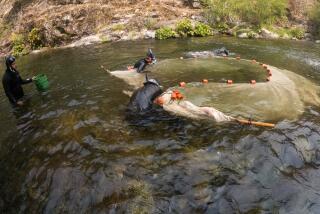Federal officials ban salmon fishing off California coast
Reporting from Millbrae, Calif. — Federal fishery managers voted unanimously Wednesday to ban commercial salmon fishing off the coast of California for the second year in a row, a move some fishermen fear could imperil the industry’s future in the name of saving it.
The Pacific Fishery Management Council also severely limited commercial fishing off the coast of Oregon for the second year and took a deep bite out of recreational salmon fishing in California, restricting that popular pastime to a 10-day window and a 130-mile stretch from the Oregon border south.
Canceling the commercial season was the only tack to take “when your bread-and-butter stock is not producing,” said David Bitts, president of the Pacific Coast Federation of Fishermen’s Assns.
“But if we don’t go fishing next year,” warned Bitts, a fisherman from Eureka, Calif., “we have to start thinking that salmon fishing in California is over.”
Only about 122,000 of the prized Chinook -- also known as wild king salmon -- are expected to journey up the Sacramento River to spawn this fall. Although that’s nearly twice as many as in last year’s dismal season, it is barely enough to sustain the salmon population.
“It’s terrible, to say the least,” said David Goldenberg, chief executive of the California Salmon Council. “But we’re going to have to deal with it, if the numbers of returning salmon are so low fishermen don’t want to fish it.”
But “dealing with it” could be easier said than done, and fishermen are not the only ones affected by the shutdown. The whole salmon infrastructure will take yet another hit, from gear stores and ice houses to fuel docks and processing plants. State officials estimated that the 2008 fishing ban resulted in a loss of $255 million and 2,263 jobs.
“Things are very fragile as far as the infrastructure is concerned,” said Duncan MacLean, a Half Moon Bay, Calif., commercial fisherman and salmon advisor to the management council. “There’s a lot of support businesses that will either relocate or go under.”
The salmon industry received a miniature federal bailout after the 2008 season was canceled -- $170 million in emergency aid, of which about $120 million was disbursed to everyone from fishermen to charter boat owners.
“It’s been a godsend for the entire industry,” said MacLean, who traveled with others in the industry to Washington last year to lobby Congress for assistance. “We wouldn’t be considering ourselves still fishermen right now if it wasn’t for that.”
It is unclear whether more aid will be available to help assuage a second year of pain. At the very least, the industry hopes last year’s leftovers will be distributed to keep fishermen and others afloat.
There is no single reason for California and Oregon’s flagging Chinook fishery, but rather a plethora of unfortunate circumstances.
Recent ocean conditions have been too warm and there has not been enough food for so-called juvenile fall-run Chinook salmon, according to a National Marine Fisheries Service report.
MacLean also points to record water deliveries to Southern California, habitat destruction caused by urbanization, pollution from agricultural chemicals and mismanagement of the Sacramento-San Joaquin River Delta.
“There’s no one smoking gun,” MacLean said, “but there are a lot of spent shell casings all over the place.”
Washington’s fisheries are healthy enough this season for commercial and recreational fishing of both Chinook and coho salmon, although there are quotas in place.
The big question is whether the salmon population will rebound enough in 2010 for salmon fishing to resume in California and Oregon.
Peter Moyle, a professor of fish biology at UC Davis, is dubious. “Ocean conditions are pretty good right now, and salmon numbers are creeping up again,” he wrote in an e-mail, “but there is no guarantee such trends will lead to fishable populations in the next 2-3 years, or beyond.”
Just before the unanimous vote, the council’s California representative said she hoped 2010 would be a better year.
“It’s very unfortunate we have no real ocean fisheries in California,” said Marija Vojkovich of the California Department of Fish and Game, ruing what she called the state’s “commercial nonseason.”
“I’m keeping my fingers crossed that this is not what we deal with next year.”
More to Read
Sign up for Essential California
The most important California stories and recommendations in your inbox every morning.
You may occasionally receive promotional content from the Los Angeles Times.










